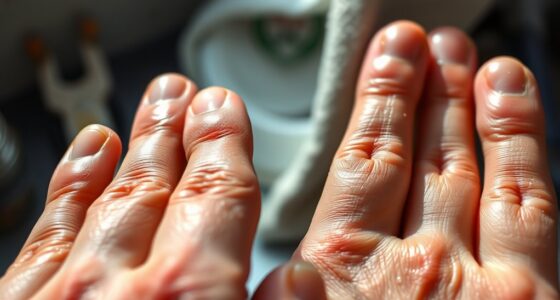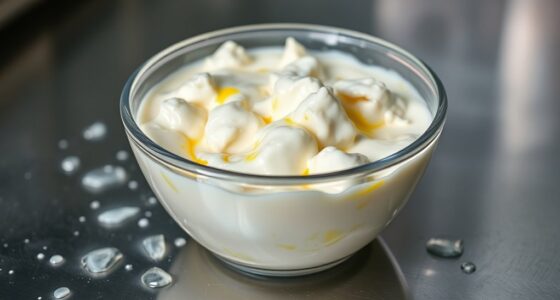Your diet influences how your sweat smells by affecting your body’s chemistry and microbiota. Consuming lots of protein, spicy foods, dairy, or sugary processed foods can lead to stronger, more pungent odors as they produce sulfur compounds or promote bacteria growth. Staying well-hydrated helps keep your sweat fresher. Long-term eating habits also play a role in shaping your scent profile. Explore further to discover specific foods and habits that can help you manage your body odor better.
Key Takeaways
- Consuming high-protein and spicy foods increases sulfur compounds and sweat gland activity, leading to stronger, more pungent odors.
- Dairy intake can produce sulfur compounds and fatty acids, which may intensify or alter body smell.
- Sugary and processed foods promote bacterial growth on the skin, resulting in more noticeable body odor.
- Hydration dilutes sweat, reducing odor intensity, while dehydration concentrates sweat and enhances scent.
- Long-term dietary patterns, such as plant-based diets, tend to produce milder, fresher sweat odors compared to meat-heavy or processed diets.
The Role of Protein-Rich Foods in Body Odor

Protein-rich foods can substantially influence your body odor because they contain amino acids that are broken down by bacteria on your skin. When you eat more proteins, your body metabolizes them into compounds like sulfur-containing amino acids. These compounds are released through sweat, and bacteria on your skin break them down further, producing foul-smelling substances. As a result, consuming high-protein foods such as meat, eggs, and dairy can intensify body odor, especially in areas with more sweat glands like your armpits and feet. The odor may become stronger and more pungent over time if you regularly consume large amounts of protein. To manage this, balancing your diet and maintaining good hygiene can help reduce the impact of protein breakdown products on your body smell. Additionally, understanding how environmental factors like humidity and temperature influence sweat composition can help you better control body odor.
Spices and Herbs That Influence Sweat Smell

Certain spices and herbs can considerably alter your sweat’s smell, especially when consumed regularly. For example, garlic and cumin contain sulfur compounds that can give your sweat a pungent, sometimes unpleasant aroma. Conversely, herbs like parsley and mint can help invigorate your scent. Here’s a quick overview:
| Herb/Spice | Effect on Sweat Smell | Notes |
|---|---|---|
| Garlic | Strong, pungent | Contains sulfur compounds |
| Cumin | Earthy, musky | May cause body odor |
| Parsley | Fresh, clean | Natural deodorizer |
| Mint | Cool, refreshing | Masks other odors |
Regular intake of these herbs influences your scent, either intensifying or masking odors, depending on the spice or herb.
The Impact of Dairy Products on Body Scent

While spices and herbs can subtly shift your sweat’s smell, what you eat daily also plays a significant role in your body scent. Dairy products, especially milk, cheese, and yogurt, contain compounds that can influence how you smell. When you consume dairy, your body breaks down proteins into amino acids, which can produce sulfur compounds and fatty acids. These substances may be released through sweat, leading to a stronger or different odor. Some people find that consuming large amounts of dairy results in a more noticeable scent, while others notice little change. If you’re sensitive to body odor or want to manage it better, you might consider reducing your dairy intake. Paying attention to how dairy affects your scent can help you make informed dietary choices. Additionally, certain dog names are associated with specific personality traits, which can also influence how your pet interacts with your scent.
How Alcohol Consumption Alters Body Odor

When you consume alcohol, it doesn’t just affect your behavior; it also impacts your body odor. Alcohol is processed by your liver, but some of its byproducts, like acetaldehyde, circulate through your bloodstream. These compounds are excreted through sweat, giving your skin a distinct smell. As your body works to eliminate alcohol, you may notice a slightly chemical or alcoholic scent on your skin and breath. Drinking in excess can intensify this effect, making body odor more noticeable. Additionally, alcohol can cause dehydration, which concentrates sweat and odor, making them more pungent. Your body’s natural scent can also change due to the altered balance of bacteria on your skin, further affecting how you smell after drinking. Interestingly, certain ice cream flavors can influence your body chemistry and potentially alter your scent profile.
The Effect of Processed and Sugary Foods

Consuming processed and sugary foods doesn’t just impact your health; it also influences how you smell. These foods can cause your sweat to develop a stronger, sometimes unpleasant odor. Sugar and processed ingredients promote bacterial growth on your skin, which breaks down sweat into odorous compounds. This results in a more noticeable body smell that can linger longer. To illustrate, here’s how different foods can affect sweat odor:
| Food Type | Impact on Sweat Smell |
|---|---|
| High-sugar snacks | Increase bacterial activity, intensifying odor |
| Processed foods with additives | Can cause foul smell due to chemical residues |
| Artificial sweeteners | May alter sweat composition, causing unusual odors |
| Refined carbs | Promote inflammation, affecting scent |
Adding to this, mindful decluttering strategies can help you better manage your environment and reduce the buildup of bacteria and odors on your skin.
Foods Rich in Sulfur and Their Odor-Related Consequences

Foods high in sulfur, such as garlic, onions, and cruciferous vegetables like broccoli and Brussels sprouts, can considerably influence your body odor. When you digest these foods, sulfur compounds are broken down and released through sweat and breath, often creating a strong, distinctive smell. This odor tends to be more noticeable if you consume large quantities or eat them frequently. The sulfur compounds, like allicin and its derivatives, are volatile and can linger on your skin, making sweat smell more pungent or sulfurous. While these foods offer great health benefits, their impact on scent is unavoidable. To manage this, consider moderating your intake if you notice a change in body odor, especially before social events or important meetings. Additionally, understanding relationships and emotional bonds can help you address underlying issues that may influence bodily responses and overall well-being.
The Connection Between Hydration and Sweat Smell

Staying well-hydrated helps keep bacteria on your skin in check, reducing unpleasant sweat odors. Drinking enough water also helps dilute sweat, making odors less noticeable. When you prioritize hydration, you support a healthier living environment overall.
Hydration and Bacterial Growth
Hydration plays a crucial role in controlling the bacteria that thrive on your skin, which directly impacts sweat smell. When you’re well-hydrated, your skin stays moist, which helps prevent the buildup of dead skin cells and oils that bacteria feed on. This reduces bacterial growth, leading to less odor production. Proper hydration also supports your body’s natural cleansing process, flushing out waste products that bacteria might use as nutrients. Conversely, dehydration creates a dry environment that can encourage bacteria to multiply in concentrated sweat residues. By drinking enough water, you help maintain a balanced skin microbiome, keeping bacteria in check and minimizing unpleasant odors. Additionally, emerging AI discoveries have shown that manipulating skin bacteria could further help in controlling sweat odor. Staying hydrated is a simple yet effective way to influence your sweat’s smell through bacterial control.
Water Intake and Odor Dilution
When you drink enough water, it helps dilute the concentration of sweat, reducing the intensity of odors. Proper hydration flushes out toxins and minimizes the buildup of waste products that can contribute to strong smells. When your body is well-hydrated, your sweat becomes more diluted, making it less likely to produce a pungent odor. This effect is especially noticeable after intense activities or in hot weather, where dehydration can cause sweat to become concentrated and more noticeable. Drinking enough water also supports your body’s natural ability to regulate temperature and maintain healthy skin. Adequate water intake is essential for sweat odor dilution, which helps keep your sweat smell more neutral and less offensive. Overall, staying hydrated not only benefits your health but also plays a key role in keeping your sweat smell more neutral and less offensive.
Dietary Changes and Their Long-Term Effects on Body Odor

Your long-term dietary choices can considerably influence your body odor over time. High-protein diets and spicy foods tend to increase sweat smell, especially if consumed regularly. Understanding these patterns helps you make mindful decisions for better body odor management.
Impact of High-Protein Diets
High-protein diets can markedly influence body odor over time, as the increased intake of amino acids and other nitrogenous compounds leads to changes in sweat composition. When you eat more protein, your body breaks down amino acids, producing sulfur-containing compounds like methionine and cysteine. These compounds are expelled through sweat, often resulting in a stronger, sometimes unpleasant smell. To visualize this, imagine:
| Protein Intake | Sweat Composition | Odor Intensity |
|---|---|---|
| Low | Minimal sulfur compounds | Mild or no odor |
| Moderate | Slight increase in sulfur | Noticeable but manageable |
| High | Significant sulfur release | Strong, pungent smell |
Your body’s response depends on your diet’s protein level, affecting how your sweat smells long-term. Additionally, metabolic processes can influence the extent of odor production based on individual differences and overall health.
Effect of Spicy Foods
Consuming spicy foods can substantially alter your body odor over time by triggering physiological responses that influence sweat composition. When you eat spicy dishes, compounds like capsaicin activate receptors in your sweat glands, increasing sweat production. This sweat contains more volatile substances that can produce a stronger or more pungent smell. Over the long term, regular intake of spicy foods can:
- Enhance the intensity of body odor due to increased secretion of sulfur compounds.
- Cause a temporary, noticeable change in sweat smell shortly after eating.
- Lead to a more persistent odor if spicy foods are a consistent part of your diet.
- Potentially alter skin microbiota, which can influence how sweat odors develop.
- Recognizing how body odor can be influenced by diet can help individuals manage or modify their scent over time.
These effects depend on your consumption frequency and individual body chemistry, making spicy foods a significant factor in long-term body odor changes.
Long-Term Dietary Patterns
Long-term dietary patterns can profoundly shape your body odor over time, as consistent food choices influence sweat composition and skin microbiota. Eating a diet rich in processed foods, red meats, or high-sugar items can lead to stronger, more pungent odors. Conversely, incorporating more fruits, vegetables, and whole grains can result in milder, fresher scents. Imagine a spectrum of odors influenced by your diet:
| Food Type | Sweat Composition | Microbiota Impact |
|---|---|---|
| Spicy/Processed | Stronger, sulfurous odors | Bacteria adapt, intensify |
| Plant-based | Lighter, fresher smells | Bacteria balance improves |
| High-fat foods | Pungent, persistent scents | Microbes produce odorous compounds |
Your choices today shape your scent tomorrow, so consider how long-term habits influence your body’s natural aroma.
Frequently Asked Questions
Can Certain Diets Permanently Change My Natural Body Odor?
You might wonder if your diet can permanently change your body odor. While certain foods, like garlic or spices, can temporarily alter how you smell, long-term changes are less common. Your natural scent is influenced by genetics and overall health, but diet can have a lasting impact if you consistently consume specific foods. However, most changes tend to be subtle and reversible with adjustments in your eating habits.
Do Vegetarian or Vegan Diets Affect Sweat Smell Differently?
You wonder if vegetarian or vegan diets change your sweat smell differently. These diets often involve higher intake of plant-based foods, which can lead to different body odors. You might notice a fresher scent or less pungency because plant foods contain fewer compounds that produce strong odors when broken down. However, individual differences exist, and your body’s response to these diets can vary based on your unique metabolism and food choices.
How Does Intermittent Fasting Influence Body Scent?
Imagine your body’s scent shifting like a quiet breeze, subtle yet noticeable. When you practice intermittent fasting, your body starts burning fat for energy, releasing different compounds. This process can make your sweat smell more neutral or sometimes slightly stronger, depending on your body’s response. You might notice a cleaner or more subtle aroma, as fasting helps detoxify and balance your system, influencing your overall scent in a gentle, natural way.
Are There Specific Foods That Can Eliminate Body Odor?
You want to know if certain foods can eliminate body odor. While no food completely removes odor, eating fresh fruits and vegetables, especially citrus and parsley, can help. Drinking plenty of water flushes toxins and reduces smell. Avoid strong-smelling foods like garlic and onions, which can worsen odor. Incorporate probiotics and green tea into your diet to promote healthy bacteria and reduce odor-causing bacteria.
Does Consuming Probiotics Impact Sweat Smell?
Think of your gut as a bustling city, where probiotics act like friendly messengers. When you consume probiotics, they help balance your gut bacteria, which can reduce the production of odor-causing compounds. As a result, your sweat smell may become milder and more pleasant. So, yes, including probiotics in your diet can positively influence your sweat’s aroma, making you feel fresher and more confident throughout the day.
Conclusion
By paying attention to what you eat, you can substantially influence your body odor. It’s easy to think one meal won’t make a difference, but small dietary choices add up over time. Don’t let embarrassment hold you back—taking control of your diet empowers you to feel fresh and confident every day. Remember, even minor changes can lead to big improvements. You deserve to feel good in your own skin—start today and notice the difference.









